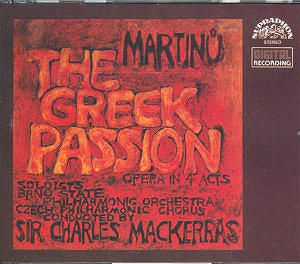During
the mid-1950s Martinů was looking for a suitable Czech subject
for an opera. He was knocked off course by discovering the Kazantzakis
novel ‘Zorba the Greek’. He even toyed with setting Zorba but
eventually found it an intractable challenge. He turned instead
to the same author's ‘Christ Recrucified’ but changed the title
to ‘The Greek Passion’. It is Martinů's last but one opera,
the final one being Ariane (also recorded on Supraphon).
In
1957 he completed it ready for Kubelik to produce at Covent Garden
however the Garden authorities rejected the work. Martinů
went back to the drawing board and produced a transformed new
version directing it to the Zurich Festival. The first version's
materials were lost until a reconstruction was made ready for
the Bregenz Festival in 1999. This was prepared by Aleš Březina.
The Bregenz performance was recorded on Koch conducted by Ulf
Schirmer. The Supraphon recording uses the revised version - the
one premiered by Paul Sacher on 9 June 1961 two years after the
composer's death. It took until 29 April 1981 for The Greek
Passion to be premiered in the UK at the New Theatre Cardiff,
Welsh National Opera under Charles Mackerras.
The
plot. The setting is the Greek village of Lykovrissi. The time
- early 20th century. A passion play is being prepared. Manolios
is to play Christ. When some refugees arrive the priest tells
then to leave. Manolios suggests where they might stay outside
the village. Katerina is obsessed with Manolios. Manolios rejects
physical passion with Katerina who plays Magdalene and she accepts
spiritual love. Manolios becomes increasingly Christlike. At a
village wedding the priest excommunicates Manolios. Panait, who
plays Judas, kills Manolios outraged at his assumption of the
role of Christ. There is mourning for the death and the refugees
prepare to leave. The opera amplifies and distorts the usual interplay
of love, guilt, envy and anger.
There
are various spoken sections including in Act 3 the conversation
between Grigoris, Patriarcheas and Ladas in which they condemn
Manolios for his Christlike exhortations about sharing property
and also in Act 2 Sc.1 when Ladas reveals his plans to exploit
the desperate refugees.
This
is a very different work from the opera Julietta. The floatingly
surreal is replaced with a dramatically cogent sense of direction
at both musical and narrative levels. Julietta can seem
perplexingly poetic. The Greek Passion pushes forward all
the time. Tragedy jostles with poetry. It helps that the libretto
is in English.
The
work bursts onto the scene like the start of La Bohème.
After a reverential hymn the music delivers a buzzing tension,
an exciting jangle of bells (a recurrent presence in this opera)
and a hum of expectation. The choral contributions throughout
have the colossal quality of Mussorgsky's crowd scenes. This applies
to both the villagers' choir and the crowd of refugees. The orchestral
tissue is rich and seething with Martinů hallmarks. In addition
there are new touches like the guitar (bouzouki?) effects at 11.02
and 19 53 in Act 1. In the second act's first bars the orchestral
evocation of a mystical dawn is touched with the exoticism of
Szymanowski's King Roger. Folk influences are felt in both
the concertina and Nikolios’s pipe playing on Mount Panagia. In
Act 3 Grigoris, driven by hate, speaks his threats over drumbeats.
In Act 4 there is the chatter and wheeze of the village band.
The chanted word: ‘amin amin amin’ recalls the imploring calls
of the choir in Janáček’s Glagolitic Mass. When Grigoris
formally excommunicates Manolios, Michelis, Yannakos and Kostandis
all stand with Manolios and the orchestra announces the joy of
their fidelity to the ideal. This is Martinů’s closest approach
to grand opera with tragic and spiritual dimension.
It
is regrettable that Supraphon chose to have only a single band
for each act. A full libretto is provided with sung English and
parallel translations into German, French and Czech. There are
no separate notes about the opera and its writing.
Rob
Barnett

